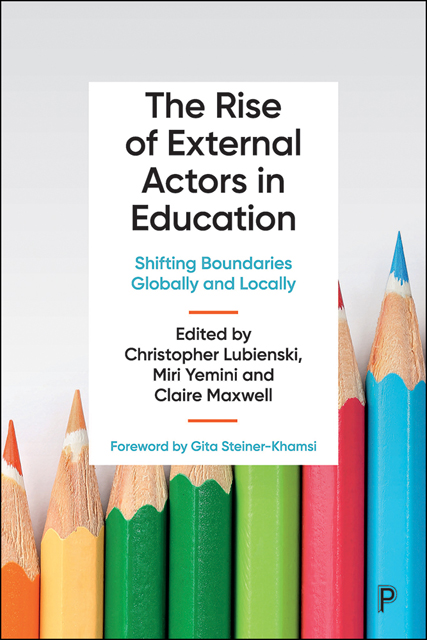Book contents
- Frontmatter
- Contents
- List of figures and tables
- Notes on contributors
- Foreword
- Introduction
- 1 Collective parental involvement: an in-between actor
- 2 When teachers become the external actor: private tutoring and endogenous privatisation in Cambodia
- 3 Cross-sectoral alliances in charter schools: the role of boards of directors from for-profit and non-profit sectors
- 4 A communitarian framework for understanding the relations between schools and NGOs
- 5 PISA for sale? Creating profitable policy spaces through the OECD’s PISA for Schools
- 6 Historical reconfigurations of internal/external actors in Danish educational testing practices
- 7 A short history of external agency involvement within education in contemporary Poland
- 8 New philanthropy in the heterarchical governance of education in Brazil
- 9 Venture philanthropy and the rise of external actors in Australian education
- 10 Power struggle in education policy change: the role of knowledge actors in structural reforms in Chile
- Conclusion: Complexity and intentionality of external actors in education
- Index
6 - Historical reconfigurations of internal/external actors in Danish educational testing practices
Published online by Cambridge University Press: 13 October 2022
- Frontmatter
- Contents
- List of figures and tables
- Notes on contributors
- Foreword
- Introduction
- 1 Collective parental involvement: an in-between actor
- 2 When teachers become the external actor: private tutoring and endogenous privatisation in Cambodia
- 3 Cross-sectoral alliances in charter schools: the role of boards of directors from for-profit and non-profit sectors
- 4 A communitarian framework for understanding the relations between schools and NGOs
- 5 PISA for sale? Creating profitable policy spaces through the OECD’s PISA for Schools
- 6 Historical reconfigurations of internal/external actors in Danish educational testing practices
- 7 A short history of external agency involvement within education in contemporary Poland
- 8 New philanthropy in the heterarchical governance of education in Brazil
- 9 Venture philanthropy and the rise of external actors in Australian education
- 10 Power struggle in education policy change: the role of knowledge actors in structural reforms in Chile
- Conclusion: Complexity and intentionality of external actors in education
- Index
Summary
Introduction
For centuries, policymakers, planners, economists, and educationalists working in global, national, and local settings have concerned themselves with the organisation, development, and improvement of education. Education is widely regarded as a fulcrum for societal change and improvement (Popkewitz & Lindblad, 2004; Depaepe & Smeyers, 2008; Labaree, 2008; Trohler, 2020).
Today, education policy hinges on projections, future goals, and the achievement of internationally defined benchmarks and standards. National and local education provisions operate in a global space which to a large extent is defined – or conveyed – by international organisations, philanthropic foundations, private edu-businesses, and powerful governments (Mundy et al, 2016; Lewis, 2020). A core feature of this development has been the growing role of non-state actors in the transnational policymaking landscape (Menashy, 2016). In effect, modern education is defined by a complex host of programmes, technologies, data, and actors, each claiming to make education a stepping stone and a catapult for a better, more effective, more competitive, richer, and/ or more sustainable society (Lewis et al, 2016; Verger, 2019).
In line with these initial observations and the theme of this edited volume, there is a need to investigate the workings and configurations of the various contexts in which different kinds of actors emerge, interact, and struggle to shape education. One way of doing that is to map the different stakeholders engaged in and with education, which helps to illuminate the different interests, conditions, and knowledge at play in key contexts shaping education, including actors’ engagement with programmes, technologies, and data. Such an analysis allows us to extend the way we understand actors’ modus operandi in particular contexts and the likely implications of this in terms of which agendas, understandings, and practices are promoted in education. It also allows us to openly explore the reconfigurations of actors across time and space, and thus move beyond classical distinctions between internal and external actors. As demonstrated by the editors in the introductory chapter, the classical distinctions between actors in education have become blurred. Next, I argue that a historical perspective on the shifting configurations of actors in education policy spaces offers an opportunity to move beyond classical distinctions and inform the way we approach education policy formation today.
- Type
- Chapter
- Information
- The Rise of External Actors in EducationShifting Boundaries Globally and Locally, pp. 113 - 132Publisher: Bristol University PressPrint publication year: 2022

